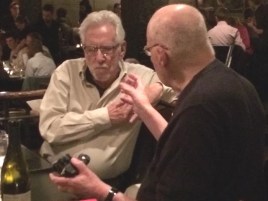A funny thing about jazz, at least lately, is that its great practitioners often get more notice when they die than when they lived. That’s certainly true about Charles Mingus who passed in 1979 and whose 100th birthday was celebrated last year to much acclaim.
Wayne Shorter, another jazz great, died last Thursday at age 89. His large recorded output survives him, of course, and now the critics (like me) grab the opportunity to speak out about his greatness, uniqueness, and transformative powers.
Shorter was one of jazz’s strong composers besides being a reed player who could shape the conventional forms of the music into something truly new. So I don’t want to hear encomiums about him; I want to know how he did this. The praise will soon fade; the music won’t.
The typical obits gave the facts, as they should. But some writers went beyond that. As jazz critics will do, they offered up spiritual, even flamboyant versions of what they heard in Shorter’s music. Richard Brody of The New Yorker knows his jazz but spoke a different language in trying to express what for him was the essence of Wayne’s music:
Unlike such spiritual seekers of the avant-garde as Coltrane and Albert Ayler, Shorter, even during his most vehement solos, wasn’t heaven-storming but heaven-gazing and heaven-longing, looking rapturously upward—again, in effect, in two places at once.
Jazz people don’t talk like this. Neither should their critics. The people who really understood how to write about Shorter were other musicians, like Ethan Iverson who wrote five years ago about Shorter’s seminal recordings in the 1960s:
The compositions on “Speak No Evil” occupy a rarified plane. They aren’t quite hard bop, they aren’t quite modal. Elements of everything are just there, hanging out in a new and inspired way. The musicians at large loved it, then and now. Every song on “Speak No Evil” has been learned by each new generation of jazz students. Every solo by Shorter, Hubbard, and Hancock has been transcribed and assimilated.
Jazz lovers want to understand how the music they love was created, appreciated (or not), and produced. Let the jazz audience, not the critics, be the spiritual and rhetorical interpreters of what they are hearing. My feelings about a piece of music may or may not be yours.
And, one hopes, the critic can positively influence the public reception and understanding of a music—and do this in a timely way. My book, Mingus Speaks, finally got published almost 40 years after I had finished the interviews with Charles. The unconscionable delay was owing to some troubling and difficult times for me. You know, “life happens when you’re making other plans.”
Anyhow, the last time I saw Mingus was after a set at the Village Vanguard in 1973, I think. He fixed me with the Mingus glare and said, “I guess you’ll finally do the book after I’m dead.” And that’s what happened.
Wayne said it best: “I never make the same mistake twice. I make it five or six times, just to be sure.”
The folks who make their living off jazz and love it and write about it should speak up when it counts. What you have to say about the music can make all the difference to the people who play it. Wayne Shorter’s music was just too singular and important to be treated with fawning praise.













